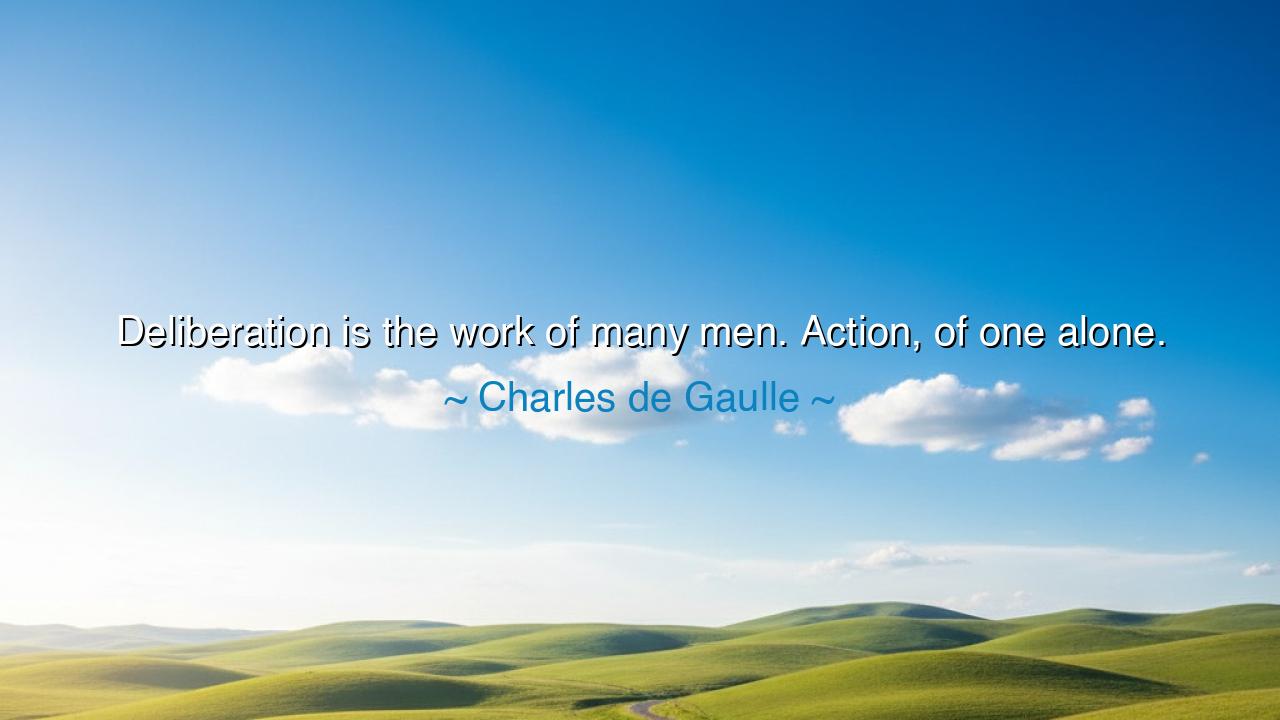
Deliberation is the work of many men. Action, of one alone.






When Charles de Gaulle declared, “Deliberation is the work of many men. Action, of one alone,” he spoke not merely as a soldier or a statesman, but as one who understood the rhythm of destiny — the eternal balance between thought and deed, between counsel and courage. His words are carved from the granite of history, born in an age when indecision could doom nations and a single act of resolve could alter the fate of millions. They remind us that while wisdom is often born in councils and assemblies, it is in the heart of one man, or one woman, that courage must finally awaken — for the moment of action belongs to the solitary soul.
De Gaulle, the towering figure of France during its darkest hour, lived the very truth of his own words. In 1940, as France fell to the storm of the German invasion, her leaders hesitated, divided between surrender and resistance. There were meetings, debates, speeches — endless deliberation among generals and ministers — but no decision that could save her honor. Then, one man — not yet famous, not yet powerful — rose and spoke for France. From London, de Gaulle broadcast his Appeal of June 18, calling upon his countrymen to resist, to fight on, to believe that France was not dead. In that moment, he acted alone, yet his voice became the soul of a nation. Thus did one man’s action give purpose to the many. His words remind us that unity in thought must one day find its embodiment in solitary action.
In this truth lies a timeless pattern. The ancients knew it well. The Greeks gathered in the agora to debate, the Romans filled their senates with orators, and the wise of every age have sought counsel in the assembly. Yet when the hour of decision comes — when thought must become flesh — it is always the individual who must step forth. The general must give the order, the explorer must set sail, the reformer must speak the forbidden word. No council, however wise, can take that final step. For in action lies accountability, and accountability belongs not to the crowd but to the conscience of the one who dares.
This is why de Gaulle’s words burn with the fire of leadership. He reminds us that deliberation — though necessary — is safe, shared, and collective. It is the domain of reason, where many voices gather to weigh the possible. But action — true, decisive action — is dangerous, lonely, and final. It requires one to bear the burden of uncertainty and the weight of consequence. To act is to accept isolation, for the moment of choice divides the one who dares from the many who discuss. The thinker may dwell among others, but the doer stands alone before history.
Consider Abraham Lincoln at the brink of the American Civil War. His advisors argued endlessly about how to preserve the Union — some urged compromise, others war, many counseled delay. The room was filled with deliberation. Yet when the time came to sign the Emancipation Proclamation, Lincoln stood alone with the pen in his hand. That act, simple in motion yet immense in meaning, forever changed the course of a nation. It was the triumph of action over hesitation, of courage over consensus. His example, like de Gaulle’s, shows that while many may prepare the ground, it is the solitary hand that sows the seed of history.
But de Gaulle’s wisdom carries a deeper lesson still. He teaches that deliberation is not weakness, nor is action arrogance. The two are brothers — one must precede the other. The wise man listens, gathers counsel, and learns from the minds of many. Yet when the moment of decision comes, he must not hide behind the comfort of endless debate. The time for talk must yield to the moment of resolve. Too often, the world perishes not from lack of knowledge, but from lack of will. The hero’s task is to bridge that chasm — to turn knowledge into motion, vision into reality.
So, my children, take this lesson to heart: listen to the counsel of many, but act by the strength of your own soul. Do not fear solitude when the hour demands decision. The crowd may deliberate, but destiny moves through those who act. Whether you lead armies, build families, or pursue your own quiet dreams, remember that no great deed was ever done by committee. The power to change your world will always rest in the courage of one — in the moment when you step forward, alone, guided not by the noise of the multitude but by the clarity of your conviction.
Thus, remember the wisdom of Charles de Gaulle: “Deliberation is the work of many men. Action, of one alone.” In these words lies the eternal law of leadership and life — that thought must gather in many hearts, but action must spring from one. The multitude may prepare the path, but only the solitary traveler walks it. Therefore, when your time comes to act, do so boldly, even if you stand alone — for it is the lone hand that moves the world.






AAdministratorAdministrator
Welcome, honored guests. Please leave a comment, we will respond soon